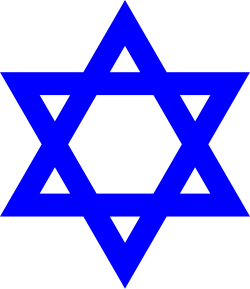大衛後裔
此條目可参照英語維基百科相應條目来扩充。 (2025年5月11日) |
| 大衛王朝 בֵּית דָּוִד | |
|---|---|
 | |
| 国家 | 以色列聯合王國 (约1010 BCE–930 BCE) 猶大王國 (约930 BCE–587 BCE) |
| 发源地 | 犹大支派 |
| 创立者 | 大衛王 |
| 末代君主 | 西底家 |
| 头衔 | |
| 地产 | 以色列地 |
大衛後裔是指以色列大衛王的後裔,在以色列統一王國時期建立了大衛王朝。犹太教有關大衛後裔的資料,是根據希伯來聖經的記錄,以及猶太傳統。
依照聖經的記載,大衛王朝之前的王朝是由便雅悯支派掃羅王建立的掃羅王朝,在掃羅王之後繼承以色列統一王國王位的是伊施波設。大衛曾和伊施波設有一段時間的衝突,雖然如此,不過神早已讓先知撒母耳膏立大衛為以色列人的王。後來伊施波設被其軍長所暗殺,大衛王在西元前1010年正式即位,成為以色列王國的王[1][2],大衛的繼位者是拔示巴所生的所羅門。在所羅門死後,羅波安繼位時,以色列十二支派拒絕大衛王朝的統治,只有猶大支派以及便雅憫支派仍接受羅波安的統治,其餘的十個支派擁立耶羅波安一世為王,在北方(撒馬利亞)建立以色列王國,猶大支派以及便雅憫支派則在南方(犹地亚)建立猶大王國。在耶羅波安叛亂成功之後,以色列王國已和大衛後裔無關,而猶大王國的國王(亞她利雅除外)仍是大衛後裔。
西元587年巴比倫圍攻耶路撒冷,之後所罗门圣殿被毁,猶大王國被新巴比倫帝國所滅。約在450年後,哈斯蒙尼王朝建立了巴比倫入侵後的第一個獨立猶太王國,不過此王國和大衛後裔、猶大支派都沒有關係。
在犹太教末世论中,彌賽亞(מָשִׁיחַ)會是猶太人的王,且其父系先祖可以追溯到大衛。他會在彌賽亞時代和來世統治犹太人[3][4][5]。
以色列聯合王國
[编辑]依照希伯來聖經,若有人被選召成為王,會在其頭上用圣膏油膏抺。大衛是由先知 撒母耳所膏立。
大衛一開始只是犹大支派的王,統治希伯伦地區,在七年半之後,統治以色列的[[[伊施波設]]死亡,其他以色列支派也歸順大衛[6]。
依照希伯來聖經,後來以色列聯合王國以及後來的猶大王國的王都是大衛的後裔,因此有權繼承王位,統治以色列(或是後來的猶大王國)。
其他亞伯拉罕宗教的詮釋
[编辑]基督教
[编辑]基督教對撒母耳记下第7章裡大衛之約有許多不同的詮釋,傳統上是指新約聖經中耶稣的谱系。有一種大衛後裔的詮釋方式是將耶穌視為約瑟的兒子,而马太福音第1章1-16節將約瑟記錄在所羅門的後裔中,而路加福音第3章23-38節將馬利亞記錄在大衛之子拿單的後裔中。
猶太人傳統上認為彌賽亞是大衛的父系後裔(彌賽亞的父系祖先可以追溯到大衛),有時也認為耶穌的家譜是猶太人不相信耶穌是彌賽亞的原因。依耶穌在世上的父親約瑟來看,耶穌不可能是大衛的父系後裔。約瑟是猶大王約雅敬的兒子耶哥尼雅的後裔,而耶哥尼雅的後裔被神禁止統治以色列[7]
Another Christian interpretation emphasizes the minor, non-royal, line of David through Solomon's brother Nathan as it is recorded in the Gospel of Luke chapter 3 (entirely undocumented in the Hebrew Bible), which is often understood to be the family tree of Mary's father. A widely spread traditional Christian interpretation relates the non-continuation of the main Davidic line from Solomon to the godlessness of the line of Jehoiachin which started in the early 500s BC, when Jeremiah cursed the main branch of the Solomonic line, by saying that no descendant of "[Je]Coniah" would ever reign on the throne of Israel again(耶利米書22章30節).[8]
The Tree of Jesse (a reference to David's father) is a traditional Christian artistic representation of Jesus' genealogical connection to David.
相關條目
[编辑]參考資料
[编辑]- ^ Carr, David M. An Introduction to the Old Testament: Sacred Texts and Imperial Contexts of the Hebrew Bible. John Wiley & Sons. 2011: 58 [2020-10-05]. ISBN 978-1-44435623-6. (原始内容存档于2020-10-11).
- ^ Falk, Avner. A Psychoanalytic History of the Jews. Fairleigh Dickinson University Press. 1996: 115 [2020-10-04]. ISBN 978-0-83863660-2. (原始内容存档于2020-10-11).
- ^ Schochet, Rabbi Prof. Dr. Jacob Immanuel. Moshiach ben Yossef. Tutorial. moshiach.com. [2 December 2012]. (原始内容存档于20 December 2002).
- ^ Blidstein, Prof. Dr. Gerald J. Messiah in Rabbinic Thought. MESSIAH. Jewish Virtual Library and Encyclopaedia Judaica 2008 The Gale Group. [2 December 2012].
- ^ Telushkin, Joseph. The Messiah. The Jewish Virtual Library Jewish Literacy. NY: William Morrow and Co., 1991. Reprinted by permission of the author. [2 December 2012].
- ^ Mandel, David. Who's Who in the Jewish Bible. Jewish Publication Society, 1 Jan 2010, p. 85
- ^ 這是因為在耶利米書22:30所記載的,神對耶哥尼雅的咒詛「耶和華如此說:要寫明這人算為無子,是平生不得亨通的;因為他後裔中再無一人得亨通,能坐在大衛的寶座上治理猶大。」(和合本)
- ^ H. Wayne House Israel: Land and the People 1998 114 "And yet, Judah has also been without a king of the Solomonic line since the Babylonian exile. Because of Jeremiah's curse on Jehoiachin (Coniah) in the early 500s BC (Jer. 22:30), the high priests of Israel, while serving as the ..."
